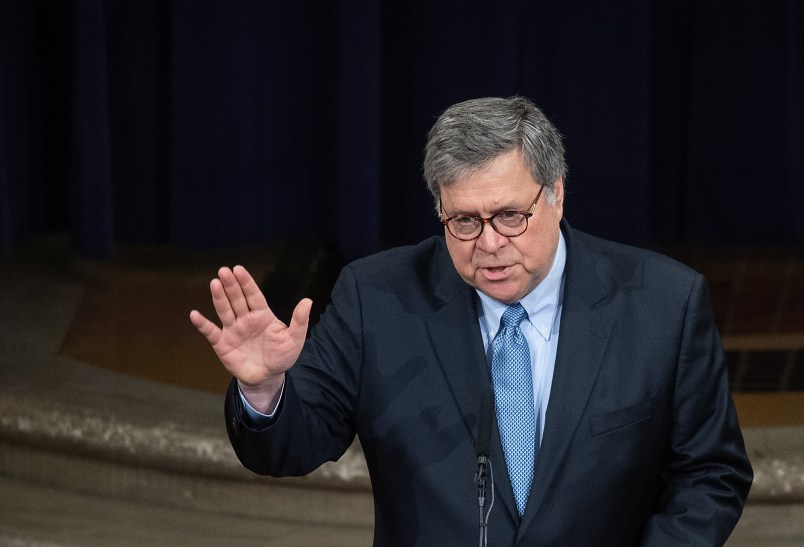The Justice Department responded to a blistering critique of its conduct in the Michael Flynn case on Wednesday, calling its decision to drop charges against the former national security adviser an “unreviewable exercise of prosecutorial discretion.”
Prosecutors submitted the filing to U.S. District Judge Emmett Sullivan in Washington, who appointed former U.S. District Judge John Gleeson to examine the Justice Department’s conduct in the case.
Sullivan appointed Gleeson to determine whether Flynn should be prosecuted for criminal contempt of court, and to argue against the Justice Department’s unprecedented motion to dismiss charges.
The DOJ held back in the filing from arguing that Gleeson’s appointment itself was unconstitutional, and instead argued that the Constitution forbids Sullivan from doing anything other than granting the motion to dismiss the charges.
The Justice Department argued in the filing that its reasoning for dropping the charges was beyond judicial review.
“The court-appointed amicus attempts to debate the government on several of these points, urging the Court to second-guess the government’s analysis,” the filing reads. “But none of the reasons the government gave in its motion to dismiss may be substantively reviewed by a court.”
The Justice Department went on to declare that Gleeson could not “question the government’s decision-making process in this case” because those deliberations are beyond scrutiny from the courts.
Echoing arguments made before the D.C. Circuit Court of Appeals last week, prosecutors added that the court’s powers “do not extend to looking beyond the government’s stated reasons in this case to a determination of whether the court believes those reasons were mistaken, whether the Court would have adopted the same analysis in the shoes of the prosecutor, or whether the court approves of the process through which the Executive arrived at its reasoning.”
From there, the Justice Department doubled down on its newfound belief in Flynn as a victim of political persecution. Rogue FBI officials conspired in January 2017 to entrap Flynn, the government averred.
Those include former FBI Deputy Director Peter Strzok, who, “since the time of [Flynn’s] plea,” has been subject to “extensive impeaching materials.”
“Strzok was fired from the FBI, in part because his text messages with Page revealed political bias against the current administration,” prosecutors wrote.
The government distanced itself from Flynn in one footnote, creating daylight between the former general’s pardon-grubbing attacks on the prosecutors who charged him.
“The government’s motion is not based on defendant Flynn’s broad allegations of prosecutorial misconduct,” prosecutors wrote. “Flynn’s allegations are unfounded and provide no basis for impugning the prosecutors from the D.C. United States Attorney’s Office.”
The DOJ did note, however, that both Flynn’s arguments and its own were based in part on documents disclosed to “an independent review of this case by the United States Attorney for the Eastern District of Missouri.”
Flynn, in his Wednesday filing, accused the special counsel prosecutors of lying and of prosecutorial misconduct in withholding exculpatory evidence.
“We know the prosecutor lied and the court’s findings were wrong,” Flynn argued.
And unlike Flynn, the DOJ tailored its legal arguments more narrowly, albeit in service of eliminating judicial scrutiny over decisions to withdraw prosecutions.
The Justice Department said that “additional information that was not before the Court emerged in the months since the decision that significantly alters the analysis.”
Most of that, prosecutors argued, went to “Flynn’s efforts to withdraw the plea, the government’s assessment of how a jury would perceive his explanations for pleading guilty, and the government’s assessment of the evidence independent of the plea.”
Finally, the DOJ addressed accusations of corruption from Gleeson by saying that those findings are irrelevant, because the courts have no power to act on those accusations when they involve a separate branch of government.
“It would plainly violate Article I to disregard a statute on the ground that
the reasons stated in the statutory preamble are ‘pretextual’ and that Congress’s real motivation was to favor special interests,” prosecutors wrote, tongue firmly in cheek. “Similarly, it would plainly violate the Pardon Clause to disregard a presidential pardon on the ground that the pardon constitutes “gross abuse.”
The DOJ then echoed the argument it made before the appeals courts: these are political questions, meant to be solved in the next election.
Read the filing here:







Unreviewable? Unreviewable?? GFY!!!
LOL, see you in the SCOTUS, Billy Boy.
The law is really clear here. The federal rules allow review by the Court for “good cause” and the reason why this rule exists - and the supreme court changed the prior rule - was because of examples of selective prosecution/political interference.
The history is clear.
So DOJ just going in and making wild claims is not only NOT going to help them with the Court, he is going to take it as further evidence that misconduct occurred. Put another way, if there was a reasonable explanation for what DOJ did, they would not be arguing it was not reviewable.
My guess is that the Court just sentences Flynn to jail, then issues an Order to show cause why DOJ should not be investigated by the Court for false statements.
P.s. Here is the law review article which lays out why DOJ is wrong:
https://www.stanfordlawreview.org/online/why-do-rule-48a-dismissals-require-leave-of-court/
So, along with the concept of the unitary executive who cannot be held accountable for anything, FUBarr also believes his authority also cannot be questioned.
This is what authoritarianism looks like!
Hugo Chavez looked cooler.